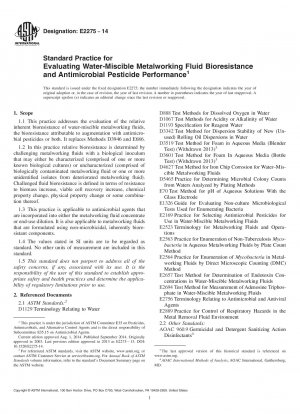ASTM E2275-14
Standard Practice for Evaluating Water-Miscible Metalworking Fluid Bioresistance and Antimicrobial Pesticide Performance
- Standard No.
- ASTM E2275-14
- Release Date
- 2014
- Published By
- American Society for Testing and Materials (ASTM)
- Status
- Replace By
- ASTM E2275-19
- Latest
- ASTM E2275-19
- Scope
5.1 This practice provides laboratory procedures for rating the relative bioresistance of metalworking fluid formulations, for determining the need for microbicide addition prior to or during fluid use in metalworking systems and for evaluating microbicide performance. General considerations for microbicide selection are provided in Practice E2169.
5.2 The factors affecting challenge population numbers, taxonomic diversity, physiological state, inoculation frequency and biodeterioration effects in recirculating metalworking fluid systems are varied and only partially understood. Consequently, the results of tests completed in accordance with this practice should be used only to compare the relative performance of products or microbicide treatments included in a test series. Results should not be construed as predicting actual field performance.
1.1 This practice addresses the evaluation of the relative inherent bioresistance of water-miscible metalworking fluids, the bioresistance attributable to augmentation with antimicrobial pesticides or both. It replaces Methods D3946 and E686.
1.2 In this practice relative bioresistance is determined by challenging metalworking fluids with a biological inoculum that may either be characterized (comprised of one or more known biological cultures) or uncharacterized (comprised of biologically contaminated metalworking fluid or one or more unidentified isolates from deteriorated metalworking fluid). Challenged fluid bioresistance is defined in terms of resistance to biomass increase, viable cell recovery increase, chemical property change, physical property change or some combination thereof.
1.3 This practice is applicable to antimicrobial agents that are incorporated into either the metalworking fluid concentrate or end-use dilution. It is also applicable to metalworking fluids that are formulated using non-microbicidal, inherently bioresistant components.
1.4 The values stated in SI units are to be regarded as standard. No other units of measurement are included in this standard.
1.5 This standard does not purport to address all of the safety concerns, if any, associated with its use. It is the responsibility of the user of this standard to establish appropriate safety and health practices and determine the applicability of regulatory limitations prior to use.
ASTM E2275-14 Referenced Document
- ASTM D1067 Standard Test Methods for Acidity or Alkalinity of Water
- ASTM D1129 Standard Terminology Relating to Water
- ASTM D1193 Standard Specification for Reagent Water
- ASTM D3342 Standard Test Method for Dispersion Stability of New (Unused) Rolling Oil Dispersions in Water
- ASTM D3519 Standard Test Method for Foam in Aqueous Media (Blender Test)
- ASTM D3601 Standard Test Method for Foam In Aqueous Media (Bottle Test)
- ASTM D4627 Standard Test Method for Iron Chip Corrosion for Water-Dilutable Metalworking Fluids
- ASTM D5465 Standard Practice for Determining Microbial Colony Counts from Waters Analyzed by Plating Methods
- ASTM D888 Standard Test Methods for Dissolved Oxygen in Water
- ASTM E1326 Standard Guide for Evaluating Nonconventional Microbiological Tests Used for Enumerating Bacteria
- ASTM E2169 Standard Practice for Selecting Antimicrobial Pesticides for Use in Water-Miscible Metalworking Fluids
- ASTM E2523 Standard Terminology for Metalworking Fluids and Operations
- ASTM E2563 Standard Practice for Enumeration of Non-Tuberculosis
Mycobacteria in Aqueous Metalworking Fluids by Plate Count Method - ASTM E2564 Standard Practice for Enumeration of
Mycobacteria in Metalworking Fluids by Direct Microscopic Counting (DMC) Method - ASTM E2657 Standard Practice for Determination of Endotoxin Concentrations in Water-Miscible Metalworking Fluids
- ASTM E2694 Standard Test Method for Measurement of Adenosine Triphosphate in Water-Miscible Metalworking Fluids
- ASTM E2756 Standard Terminology Relating to Antimicrobial and Antiviral Agents
- ASTM E2889 Standard Practice for Control of Respiratory Hazards in the Metal Removal Fluid Environment
- ASTM E70 Standard Test Method for pH of Aqueous Solutions With the Glass Electrode
ASTM E2275-14 history
- 2019 ASTM E2275-19 Standard Practice for Evaluating Water-Miscible Metalworking Fluid Bioresistance and Antimicrobial Pesticide Performance
- 2014 ASTM E2275-14 Standard Practice for Evaluating Water-Miscible Metalworking Fluid Bioresistance and Antimicrobial Pesticide Performance
- 2013 ASTM E2275-13 Standard Practice for Evaluating Water-Miscible Metalworking Fluid Bioresistance and Antimicrobial Pesticide Performance
- 2003 ASTM E2275-03(2008) Standard Practice for Evaluating Water-Miscible Metalworking Fluid Bioresistance and Antimicrobial Pesticide Performance
- 2003 ASTM E2275-03e1 Standard Practice for Evaluating Water-Miscible Metalworking Fluid Bioresistance and Antimicrobial Pesticide Performance
- 2003 ASTM E2275-03 Standard Practice for Evaluating Water-Miscible Metalworking Fluid Bioresistance and Antimicrobial Pesticide Performance
